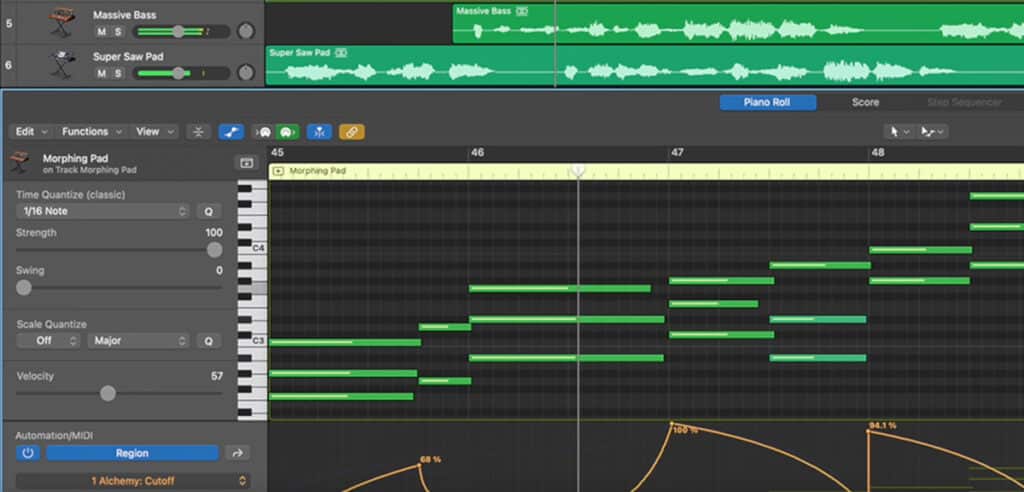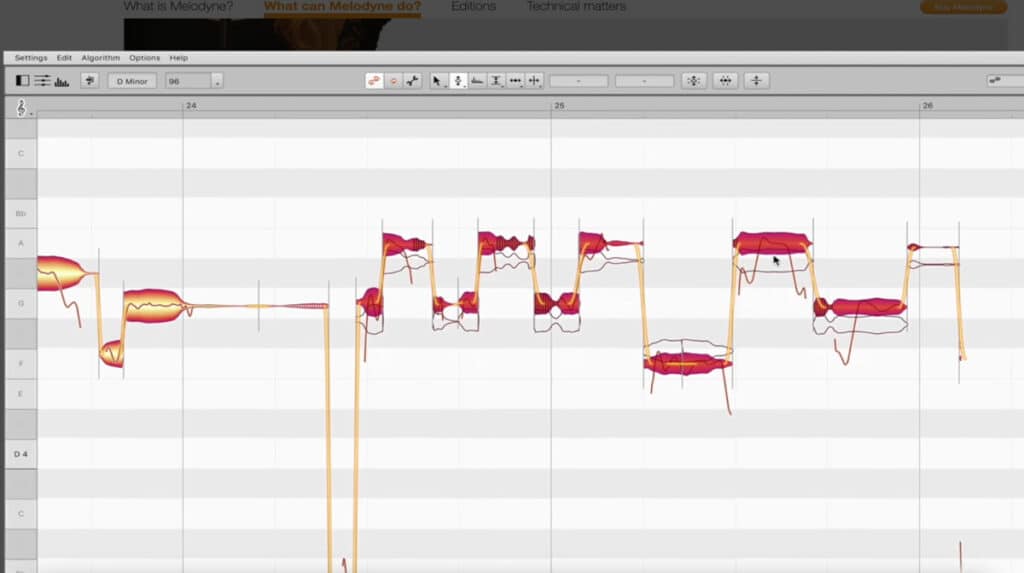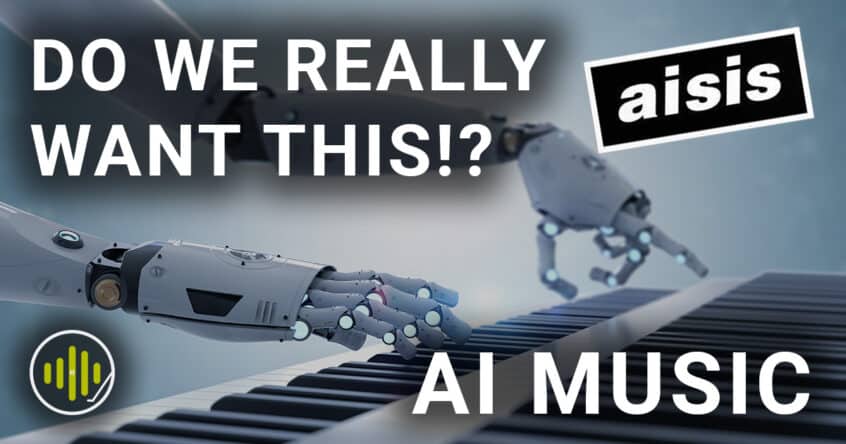No matter where you live in the world and regardless of your native tongue, one single language unites humanity: music.
In the words of the late American poet Henry Wadsworth Longfellow, “Music is the universal language of mankind.”
Without even needing to understand the words being sung, music has the power to move us emotionally. It’s part of what separates us from other beings on this planet, as we have the capability to express our feelings, experiences, and memories creatively through music.
In other words, music speaks to the human condition.
Where then do we stand if artificial intelligence can simply generate music (or a performance) on our behalf?
Keep scrolling for the complete article or watch the video summary below:
Just recently, a fascinating music project surfaced on YouTube raising some serious questions about the trajectory of music relating to artificial intelligence (AI).
The project in question is AIsis, a project involving a band of Oasis fanatics who set out to create a full album of “lost tapes” material, imagining an alternative reality where the band’s original line-up continued to create music in the style of their celebrated 90s albums.
The songs are original—written by a band called Breezer in an Oasis style—but the vocal is an AI-generated fake of Liam Gallagher’s voice, and it’s scarily accurate.
This raises so many questions about the future of music, copyright, and the importance of music to humanity.
We are just at the beginning of seeing AI’s power and potential. At the moment, AI is only as good as the information fed to it by humans, but when you consider how far technology as a whole has progressed in the last 30 years, it begs the question: where are we heading here? Is this a positive change? Do we really want this future? Is it inevitable?
To understand the context of what I’m relaying here, I recommend you listen to the project which I’ve embedded below:
This isn’t an isolated example either. Just recently, an A.I.-generated collaboration between Drake and The Weeknd, “Heart on My Sleeve,” surfaced and was pulled from Apple, YouTube, and Spotify after a complaint by Universal Music. The collaboration never actually happened.
I don’t know about you, but I’m getting deja vu and flashbacks to the music industry’s clash with technology over Napster and the rise of digital downloads, a technological shift from which the industry has never really fully recovered.
The power of AI to turn the industry on its head is arguably even greater than the aftermath of digital downloads and the decline of music ownership.
If musicians can easily create convincing copies of an artist, or fake collaborations without their involvement, where does that leave us from a copyright or trademark standpoint legally? It would appear that things are about to get very murky and complicated.
Dehumanizing Music
All credit to the folks behind the AIsis project; it’s an interesting experiment, and undoubtedly a lot of work went on behind the scenes to get the AI version of Liam Gallagher to sound convincing.
For me, though, it represents the next stage in the dehumanization of music that has been steadily marching forward for decades now.
Starting with the introduction of tape machines after the second world war, our ability to edit recordings and polish out mistakes has steadily increased.
What began as physically splicing tape has developed into the modern digital recording process where every beat and note can be corrected from a timing and pitch perspective.
Pitch correction via software like Autotune is fairly well documented and understood by music consumers, but quantization is perhaps less understood by the studio recording layman.
Essentially, quantization is a process where-by (so long as you record to a click track) every note can be shifted and locked to a timing grid, either to correct timing mistakes, or in extreme cases, remove human error almost entirely.

I’m not suggesting every modern recording takes this process to its extreme capabilities. Still, undoubtedly, technology has shifted our expectations of perfection and changed our tolerance level for human error. Perhaps, simply because correcting these small amounts of human error is simply so easy now.
Software plugins like Melodyne combine pitch and timing correction into one handy space, allowing producers and engineers to manipulate recordings on a very granular level. You can easily edit pitch and time note-by-note – re-writing entire melodies or even creating layered harmonies.

Critics of these practices will argue this level of editing has stripped the human performance out of recordings, resulting in clinical recordings that lack character and fail to connect with listeners in the same way as older, more organic productions.
So what happens if we remove humans from the process almost entirely? Sure, AI needs human input now, but on the current trajectory, I can envisage a time when AI might generate entire albums from start to finish.
Suppose fully AI-generated music does indeed come to fruition. In that case, the transformation of music from a creative outlet for humans to express experiences and emotions to it being a simple commodity will be complete.
Only time will tell, but for now, I fail to see how AI music will speak to the human condition on a universal level in quite the same way.
It begs the question: do we even want this? Sure, it’s a fascinating experiment at the moment, but what do we stand to lose if the current trajectory unfolds without a quiver of opposition or questioning about the consequences?
AI-generated music is just the tip of the iceberg, of course. There are debates beyond music about AI-generated everything, from articles to artworks and much more. I argue that what we stand to lose here is the meaning of life itself.
If both our creative and productive output is replaced by AI, then it leaves us without purpose. Without purpose, our emotional and physical health may suffer greatly.
Is all this inevitable? Well, as Isaac Newton concluded, for every action there is an equal and opposite reaction. I firmly believe this is precisely what has driven the resurgence in interest for vinyl records. As music consumption became increasingly clinical, firstly with digital downloads and then streaming services, music fans have sought to regain some authenticity and connection with music that digital platforms simply can’t deliver.
Will the rise of AI music produce a similar counter-movement? Well, that, my friends, is in the lap of the gods.




Great insights into AI’s impact on music! For those navigating the digital era, Test-English provides practical resources to enhance English skills, ensuring clear communication in international collaborations and discussions about music and technology.
I started listening to the AISIS Mix tape and it sounded flat, plastic and like commercialized pop. If I listened to it without knowing what it was, it wouldn’t be an album I’d buy. It is like Japanese Scotch vs. the real McCoy, it lack soul. Would AI come up with Willie Nelson, Bob Dylan, Joe Cocker or Hendrix. There are so many rule breakers that made great music and I don’t see AI doing that, AI could probably make Taylor Swift or Celine Dion like music but could it come up with Amy Winehouse or Kate Bush? I believe AI could make listenable music but it would skew towards the mean.
Hey David! I’m just glad the guys at Breezer were honest about it. I’m sure there will be plenty of examples where people will release AI music without being up-front about it. I fear things are about to get very messy unless the music industry stands its ground.
And yes, I can’t see AI generating anything on the level of Kate Bush Hounds of Love, an album I absolutely adore.
I’m saddened by the onset of AI music…. As a musician of 50 years, I’ll never appreciate music created by a soulless computer program…..
I do worry about where it’s all going. I don’t want a future where I can’t tell what was created by a human and what was not. Editing humans is one thing, but taking them out of the equation completely seems a step too far. Only time will tell how we respond to all of this as it unfolds.
I want AI to do all the jobs for me so I have more time to listen to music
Haha! 🙂
Marc:
Interesting discussion about AI “music”. It may “sound” like music, but to me music is an expression and communication of one’s emotions. Songs tell a story; they are a form of communication. What resonates with me about a song is the story – the reason the song came into existence to begin with. Without human experiences, almost all of the songs that we know would never exist.
As you stated, the recent vinyl resurgence (or continuation, for some of us who still have our albums from when we bought them originally) could be a form of “natural selection.” After experiencing digitized and electronic music, the human mind/ear migrates back to the simpler and purer sound of music.
I have a favorite saying — there are people who play music and there are people who MAKE music. My opinion is that AI might play music, but it would never MAKE music.
Keep up the great work you are doing. You have topics that range from the very practical to the more esoteric. Just like music, I’m not interested in everything, but this issue clearly “resonated” with me!
Thanks.
Hey Phil – thanks so much for your comment on this. I agree – the human story and expression is so key to what makes music so powerful.
I’m glad this issue resonated with you. I feel quite passionately about the whole issue.
One of the key drivers behind me starting this site was the decline of music’s importance in society and how a physical medium like vinyl helps counter this……so the introduction of more AI in music just feels like another stage in the dumbing down of the whole listening experience. Shame.
You’re spot on. There’s such a bias toward tech = progress and such a feeling of inevitability in the air that people don’t give themselves permission to just say no. AI tools to solve creative problems will be one thing. Generative AI to make songs appear and exploit the voices of artists are just unethical by default it seems to me. I wrote about this at length here: https://stringtheories.substack.com/p/the-sadness-of-singing-robots
Thanks Chris. Your article is superb; I just finished reading it. “With AI music, there’s no creator with whom to empathize and thus no energy to exchange.” – absolutely.
People should have many MANY burning questions about all this as you say. Many are not looking beyond their noses and may well be sleepwalking into something that one day we’ll wake up to and regret.
One thing is certain, I will NEVER be flooding this site with AI content. Interesting points about AI royalty-free music. I’ve always used my own compositions (any I have without lyrics) as my background music, just because I dislike the impersonal nature of stock-music.